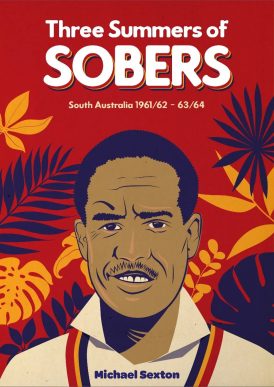Three Summers of Sobers
Martin Chandler |Published: 2022
Pages: 78
Author: Sexton, Michael
Publisher: www.sportswords.com.au
Rating: 4.5 stars

Who is the greatest cricketer to have played the game? The answer to that most subjective of questions varies widely. The nationality and age of those called upon to make the judgment makes a big difference, but for most who are into their seventh decade natural bias towards home players disappears, and the answer can only be one man, Garry Sobers, the man whose feats dominated the 1960s.
Sobers was undoubtedly the closest thing there has been to the complete cricketer. Above all he was an exhilarating batsman of the highest class, but there was much more to Sobers than just that. He was an exceptional left arm quick bowler, and a top class finger spinner and wrist spinner. If that weren’t enough as a fielder, and especially a close catcher, he has had few equals.
It is hardly surprising in the circumstances that, given the vast array of books that have been written about the game and its players, Sobers has been the subject of several. There have been as many as three autobiographies and a number of biographies, albeit the definitive book on Sobers’ life has yet to be written.
But whatever may appear in the future that will not make an iota of difference to the pleasure that future generations will derive from this delightful little book by Michael Sexton. Any book on Sobers would rapidly become unmanageably large if it sought to examine his cricketing career beyond the Test match arena in great detail, something which, covering a brief interlude of time, Three Summers of Sobers does very well indeed.
In the early 1960s making a living from playing cricket was not something that could be done in the Caribbean, so West Indians came to England and played professionally in the Leagues in the Northern Hemisphere summers. Then, following the remarkable series of the first tied Test in 1960/61 Sir Donald Bradman was instrumental in bringing Sobers to Australian domestic cricket, and he played grade cricket as well as Shield cricket and coached an adoring fan base of youngsters.
The three years culminated in South Australia winning the shield for the first time in more than a decade, and with bat and ball Sobers made a big contribution to their success. Interestingly at grade level he was not as dominant as might be expected. He began with a first ball duck, followed it with another and just a single at his third attempt!
Outside cricket Sobers contributed his thoughts to newspapers, put in appearances whenever he was asked to and did some sales work for a car dealership. No doubt a large part of that work involved Sobers favourite non-cricketing activity, tearing up the local golf courses, as well as socialising generally. Every one seemed to like Sobers, who mixed freely with all, and enjoyed life to such an extent that when, in an attempt to keep up with him in the pubs and clubs, the help of renowned party animal Neil Hawke was sought, even the legendary Hawkeye had to play second fiddle.
In the circumstances Three Summers of Sobers is most certainly a happy tale, and the joy of the times are brought to life by Sexton’s writing, which is liberally sprinkled with contributions from those who were there at the time. Well illustrated and nicely produced this is one that is essential reading for all Sobers aficianados and follows on neatly from a not dissimilar booklet from two years ago on the subject of Barry Richards. Both Sobers and Richards spent their Australian years in South Australia, but I hope that Sexton is not going to confine himself to South Australian subjects, as he really should look at working on similar projects in respect of Wes Hall, Rusi Surti and Colin Milburn






Hi Martin. I think there is a word missing from the last paragraph,
“I hope that Sexton is going to confine himself, ”
I think the word not should be added between is and going.
Comment by Greig Norman | 11:56am BST 23 October 2022